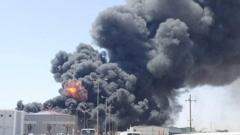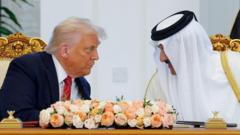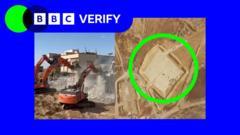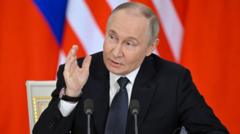During his visit to Saudi Arabia and other Gulf states, Trump declared an end to U.S. nation-building efforts while promoting a hands-off approach. His comments ignited discussions on their implications and the impact on existing alliances and conflicts.
Trump's Radical Shift in Middle East Policy: A New Era or Old Failures?

Trump's Radical Shift in Middle East Policy: A New Era or Old Failures?
President Trump's recent trip to the Middle East signifies a major pivot from traditional U.S. foreign policy, sparking diverse reactions across the region.
President Trump has made headlines with his recent remarks in Saudi Arabia, suggesting a stark departure from the longstanding U.S. policy of intervention and nation-building in the Middle East. Addressing an audience in a lavish ballroom, he proclaimed that Americans would no longer impose their values on the region, instead empowering Middle Eastern nations to shape their own futures. This bold statement was part of a four-day diplomatic tour that also included stops in Qatar and the United Arab Emirates, where the focus was as much on business dealings as it was on broader diplomatic relationships.
Reactions to Trump's speech came swiftly, illustrating the mixed feelings among various factions in the Middle East. While some viewed his comments as an opportunity for greater autonomy and a chance to reshape regional governance, others expressed skepticism about America's withdrawal from its traditional role. Notably, his meeting with Syrian President Ahmed al-Shara—the first high-level encounter between U.S. and Syrian leaders in over two decades—has drawn particular attention, as Trump's description of the young leader as a "tough guy" suggests a willingness to engage with figures once deemed controversial.
On the economic front, Trump revealed significant business deals, including a monumental agreement in which Qatar Airways committed to purchasing 210 Boeing jets. Additionally, a defense cooperation statement was signed with Qatar, highlighting the administration's intent to maintain strategic partnerships even amid calls for a less interventionist approach.
Amidst these macro-level changes, local conflicts continue to rage. Reports indicated severe Israeli airstrikes in Gaza, leading to a significant loss of life and raising questions about the fate of Hamas leader Muhammad Sinwar. The question remains whether these developments will influence regional stability or further complicate ongoing conflicts.
As the implications of Trump's declarations unfold, observers are left contemplating whether this new direction will herald a genuine shift in alliance and strategy or simply reflect previous failed attempts to balance complex dynamics within the region.





















